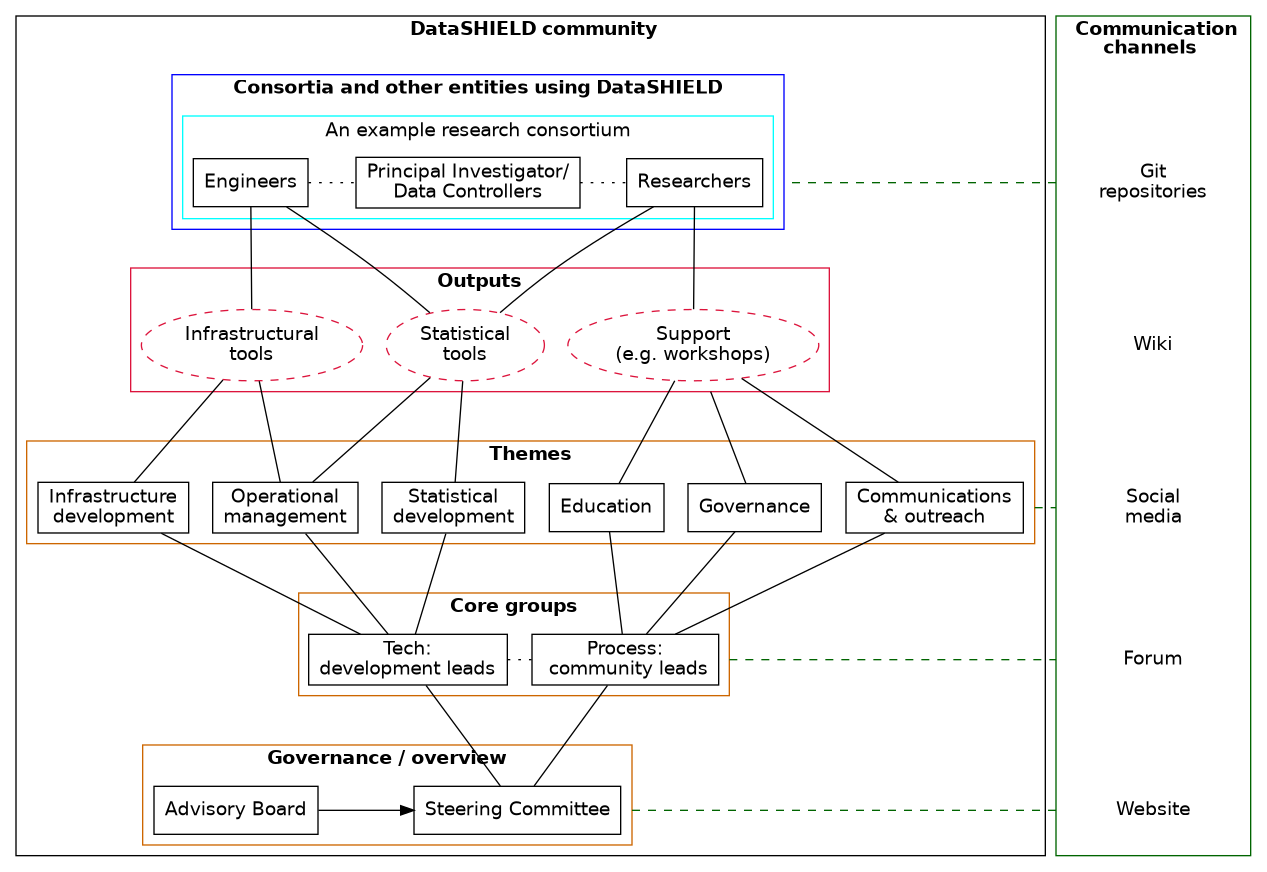¶ Welcome to the DataSHIELD wiki
This wiki contains information about DataSHIELD - both the software involved and the supporting community.
¶ Getting started
We have structured information in the wiki around user journeys, i.e. how and why you are using DataSHIELD. We have identified five main types of user:
- Systems operator - Installing and maintaining DataSHIELD on your server.
- Data Manager - Managing your data and providing access to researchers.
- Researcher - Applying for data access, conducting research and disseminating results.
- Developer - Writing or contributing to DataSHIELD packages.
- Community contributor - Contributing to the wiki or the broader DataSHIELD community.
We've also got a selection of tutorials for doing analyses:
- Analysis tutorials - Detailed tutorials on conducting analysis with DataSHIELD
¶ Getting support
In addition to the wiki, there are two main sources of help:
- The DataSHIELD forum
- The DataSHIELD Slack channel maintained as part of the MOLGENIS open source project for scientific software. If you would like to join, please email support@molgenis.org and request access.
Through both of these channels you can ask questions and receive updates about DataSHIELD.
¶ Contributing to the wiki
Anyone can edit the wiki, but to do so you'll need to request a wiki account (detailed on the community participation page), then you'll be able to make any changes you like. If there is something missing or you think something could be improved, feel free to add or edit it! You don't need to ask permission (all changes are stored, so it's easy to revert to a previous version if something is accidentally deleted).
¶ The Community Structure
The DataSHIELD community structure is outlined in the image, it comprises themes, core groups, a Steering Committee (SC) and the DataSHIELD Advisory Board (DAB). Click on the image to see the full size diagram.
Anyone can be a member of the DataSHIELD Community. Members are able - and actively encouraged - to participate in the life of the project and the community as much as possible. This might involve editing the wiki, posting on the forum, creating new or updating existing software, or simply using DataSHIELD in your own work and encouraging your friends and colleagues to get involved.
Additionally, some people are Voting Members of the community. Voting Members have certain privileges and obligations. These include agreeing to further the aims of the DataSHIELD Community and to follow DataSHIELD Community principles; doing work that is valuable for the DataSHIELD Community; and being eligible to participate in decision-making.
¶ Themes
The DataSHIELD Community is organised into Themes; Themes are the way the day-to-day work of the community is organised. Themes are classified as either 'Tech' or 'Process' related (the Theme Leads belong to the relevant Core Group as noted below) and there are six altogether, three relating to technical aspects of the project and three relating to process aspects of the project.
Each Theme has a dedicated section of the wiki related to their activities. In general, the Theme's home page states the agreed purpose of the Theme, its working practices and how it will communicate with other Themes. The Themes also each have a dedicated section of the forum, which should be used as the primary means for communication.
- Tech: Infrastructure development || Operational management || Statistical development
- Process: Education || Governance || Communications and outreach
¶ Core groups
There are two Core Groups for the DataSHIELD community: the Tech and Process Core Groups. The primary objective of the Core Groups is to provide coordination across the different Themes. The Technical Core Group is responsible for overseeing the Themes which are categorised as having a predominantly technical purpose, whereas the Process Core Group focuses on overseeing Themes with a non-technical purpose. These bodies have responsibility for ensuring that Themes are complementary to each other and do not overlap or duplicate work. They are also responsible for arbitrating decisions or conflicts between different Themes within their domain; problems may be escalated to the Steering Committee if required.
¶ Cross Theme Special Interest Groups (SIGs)
The primary purpose of Special Interest Groups are to provide coordination, across the communities themes, on a particular topic. There are at presently two Cross Theme Special Interest Groups: the Kubernetes SIG and the Survival Analysis SIG.
¶ Steering Committee
The Steering Committee provides overall leadership to the DataSHIELD Community and has day to day responsibility for the project. More information is provided on the following page:
¶ Advisory Board
The advisory board provides external expertise to the steering committe to facilitate governance and sustainability of the DataSHIELD software and community. More information is provided on the following page:
